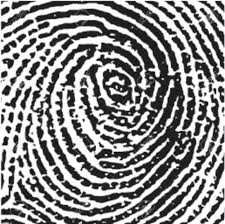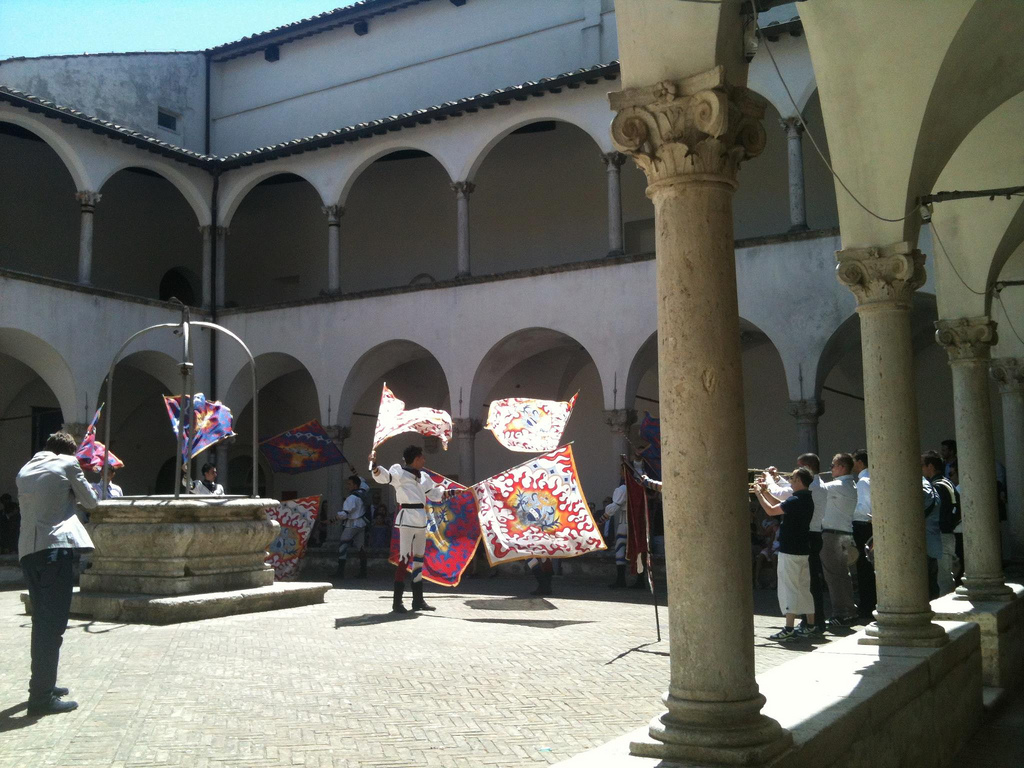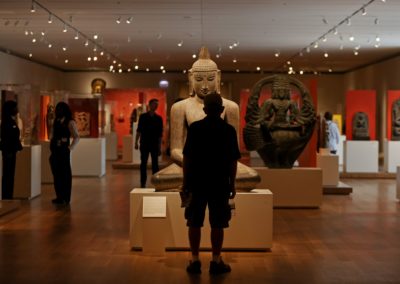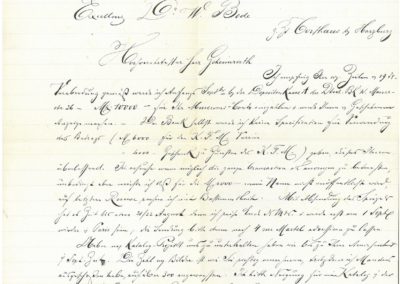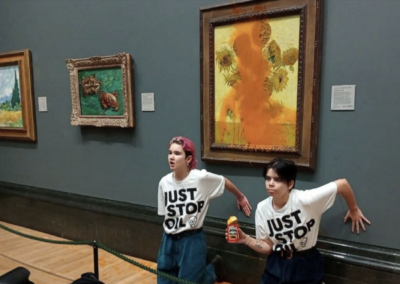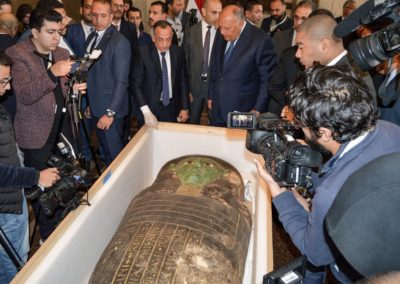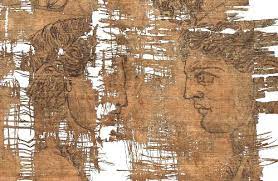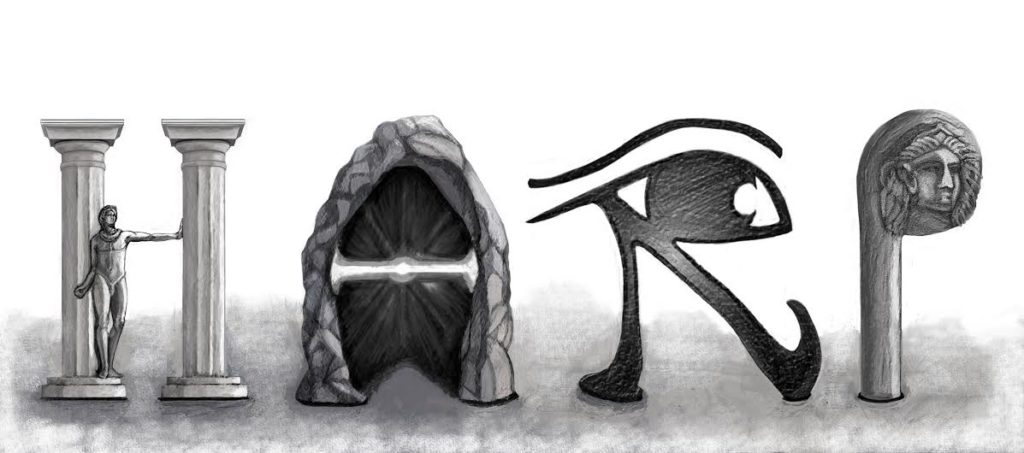The Amelia Conference – 2025
ARCA’s Annual Interdisciplinary Art Crime Conference
Please join us June 20-22, 2025!
Amelia, Italy
20-22 June 2025
Chiostro Boccarini
Piazza Augusto Vera, 10
05022 Amelia TR
Italy
Day(s)
:
Hour(s)
:
Minute(s)
:
Second(s)
The Amelia Conference will be held inside the Civic Archaeological Museum and Paintings Gallery cloister at the Collegio Boccarini in Amelia, Italy.
The fate of the Adolphe Schloss Collection – Lessons learned from provenance research during the pandemic.
Papyrus and Provenance, solving more than an ancient puzzle – The case of the Artemidorus papyrus and its controversial seller, Serop Simonian.
The Amelia Conference:
ARCA’s Annual Interdisciplinary Art Crime Conference
Conference Dates – June 20 – 22, 2025
Conference Sessions – Collegio Boccarini Conference Hall
Adjacent to the Museo Civico Archeologico e Pinacoteca Edilberto Rosa
Amelia, Italy
Registration is now ope via Eventbrite, please click here.
Held in the beautiful town of Amelia, Italy, the seat of ARCA’s summer-long Postgraduate Certificate Programmes in Art Crime and Cultural Heritage Protection, the Association’s 15th annual Amelia Conference is scheduled for the weekend of June 20-22, 2025.
In keeping with our annual tradition, this year’s conference weekend will kick off with an opening themed icebreaker cocktail on Friday, June 20, 2025. Held annually, this evening networking event gives all Amelia Conference attendees time to leisurely arrive to the city after flights, to check in to their lodgings, and to start their weekend off in an entertaining and relaxed social event atmosphere designed to allow everyone to get to know one another or to reconnect before the start of the conference’s busy weekend. This Friday evening event will include heavy hors d’oeuvres and presents a chance for our attendees to engage with new colleagues as well as catch up with old prior to the serious discussions to be had during the weekend’s presentations at the conference venue.
At the heart of the Amelia Conference will be two days devoted to presentations on Saturday and Sunday, June 21-22, 2025, held in the Collegio Boccarini Conference Hall on topics of common concern in the field.
Each year ARCA’s annual Amelia Conference serves as an arena for intellectual and professional exchange and highlights the nonprofit’s mission to facilitate a critical appraisal of the need for protection of art and heritage worldwide. Over the course of this one weekend each summer, our art crime-focused event serves as a forum to explore the indispensable role of detection, crime prevention, and scholarly and criminal justice responses, at both the international and domestic level, in combatting all forms of crime related to art and the illicit trafficking of cultural property.
Geared towards international organisations, national enforcement agencies, scholars, cultural institutions, and private sector professionals in the art and antiquities protection fields, the Amelia Conference follows a long-established commitment by the Association to examine contemporary issues of common concern in an open, non-combative, multi-disciplinary format in order to promote greater awareness and understanding of the need for better protection of the world’s cultural patrimony.
Given the success of the Amelia Conference over its previous editions, it is important to recognise the growing interdisciplinary and international nature of this emerging field, the growing complexity of art and heritage crime, and the disciplines and subject matter experts who follow along and contribute within their areas of speciality. With that in mind, this year’s conference will build upon topic-specific sessions designed to stimulate discussion and share learning on a series of topics of common concern. Some conference panels may feature more active panel debate about a session topic, or present various and/or contrasting perspectives about a topic.
Confirmed presentation titles and presenters are being added as speakers confirm their attendance.
Balancing cultural property protection with a thriving arts sector: the 1970 UNESCO Convention in the Kingdom of Saudi Arabia
Ala’a Otain
1970 Convention Team Lead, Heritage Commission
Kingdom of Saudi Arabia, KSA
Sofia Cecchi
Advisor, Heritage Commission
Kingdom of Saudi Arabia, KSA
Switzerland’s fight against the illicit trafficking of cultural property:
Key insights after 20 years of implementing the 1970 UNESCO Convention in Switzerland
Tania Esposito, Attorney at Law
Deputy Head of the Specialized Body for the International Transfer of Cultural Property
Federal Office of Culture, Swiss Federal Department of Home Affairs, Switzerland
Bellingcat’s Justice and Accountability Unit: A Case Study for Making Open-Source Investigations Legally Sound
George Katz, Lawyer
Justice & Accountability Unit
Bellingcat, UK
Please could you focus more on the “psychic” Detective?’ Crimertainment and criminologists’ public engagement through media work
John Kerr Ph.D.
Head of Policing and Criminology
University of Law, UK
Dear Art Curators: That’s Not ‘Art’—That’s Our Aji’s Beloved God
Sanjay Adhikari, BA, LLB, LLM candidate
Nepal Heritage Recovery Campaign, Public Interest Litigator
ARCA, Nepal Cultural Advocacy Expert, Nepal
Curators’ Big Little Crimes. Criminological, Ethical, and Legal Perspectives on Museum Curators’ Involvement in Art Crime
Camilla Brunazzo Chiavegato, MA
Rijksuniversiteit Groningen, Netherlands
David vs. Goliath: the fight for survival of the legal art market in antiquities against the superpowers of the States in the field of cultural heritage protection – The existential threat posed by Sotheby’s v. Greece and Safani v. Italy via sovereign immunity
Mirta Aktaia Fava, M.A., LL.M.,
Art adviser and International Lawyer
Aktaia, UK
The controversies of the Koh-i-noor diamond – should it be repatriated?
Yasmine Zahir, LLB, PCLL,
Barrister-at-Law
Liberty Chambers, Hong Kong
Artful Deceptions: How One Trafficker Corrupted Museums Internationally (With Some Help From Scholarly Enablers)
Eleni Vassilika Ph.D.
Egyptian and Greek Art and Archaeology, UK
Should You Know Better? Evaluating Art Crime Literacy in the Fine Art Market
Aubrey Catrone, MA.
Director
Proper Provenance LLC
Accredited Member
Appraisers Association of America, USA
Cultural Heritage Anti-Trafficking Training for U.S. Federal Agencies
Dawn V. Rogala, Ph.D.
Program Manager and Conservation Team Lead, Museum Conservation Institute
Smithsonian Institution, USA
The Changing Face of art crime – When did the criminal become civil?
James Ratcliffe, GDL, LPC, MSc.
Director of Recoveries & General Counsel
Art Loss Register, UK
The Changing Role of Museums and Institutions in Response to Problematic Art and Antiquities in Their Collections
Yagmur Koyuncu, MA.
Analyst, Circulating Artefacts Project
The British Museum, UK
The South East Asia Connection
Steven Gallagher, BA, LLB.
Professor of Practice in Law, Faculty of Law
The Chinese University of Hong Kong, Hong Kong
Anti-Money Laundering Regulation and the Art Market: EU, UK and US Perspectives
Saskia Hufnagel, LLB, LLM, Ph.D.
Professor of Law
University of Sydney Law School, Australia
Conference Attendee Profile:
The 2025 conference is open to attendees from different disciplines, practitioners, and policy- and decision-makers as well as anyone with an interest in the protection of art and the complexity of art crimes. Registration for the event will remain open until June 15, 2025 subject to space limitations.
Conference Registration Fees for 2025:
€170 for both days’ sessions for professionals, includes icebreaker cocktail.
€110 for both days’ sessions for university students providing proof of current enrolment in an academic program, includes icebreaker cocktail.
€90 for both days’ sessions for university students providing proof of current enrolment in an academic program.
All registration fees include entry to all conference panel sessions plus complimentary morning and afternoon refreshment breaks with coffee, juice, and light pastries on Saturday and Sunday morning and afternoon.
FINAL NOTE
ARCA is a small civil society organisation. Due to our extremely limited operational budget, all participants and presenters attending the Amelia Conference are responsible for their own registration fees, travel and accommodation expenses travelling to, and while in, Italy.
The Amelia Conference:
ARCA’s Annual Interdisciplinary Art Crime Conference
Conference Dates – June 20 – 22, 2025
Conference Sessions – Collegio Boccarini Conference Hall
Adjacent to the Museo Civico Archeologico e Pinacoteca Edilberto Rosa
Amelia, Italy
Registration is now ope via Eventbrite, please click here.
Held in the beautiful town of Amelia, Italy, the seat of ARCA’s summer-long Postgraduate Certificate Programmes in Art Crime and Cultural Heritage Protection, the Association’s 15th annual Amelia Conference is scheduled for the weekend of June 20-22, 2025.
In keeping with our annual tradition, this year’s conference weekend will kick off with an opening themed icebreaker cocktail on Friday, June 20, 2025. Held annually, this evening networking event gives all Amelia Conference attendees time to leisurely arrive to the city after flights, to check in to their lodgings, and to start their weekend off in an entertaining and relaxed social event atmosphere designed to allow everyone to get to know one another or to reconnect before the start of the conference’s busy weekend. This Friday evening event will include heavy hors d’oeuvres and presents a chance for our attendees to engage with new colleagues as well as catch up with old prior to the serious discussions to be had during the weekend’s presentations at the conference venue.
At the heart of the Amelia Conference will be two days devoted to presentations on Saturday and Sunday, June 21-22, 2025, held in the Collegio Boccarini Conference Hall on topics of common concern in the field.
Each year ARCA’s annual Amelia Conference serves as an arena for intellectual and professional exchange and highlights the nonprofit’s mission to facilitate a critical appraisal of the need for protection of art and heritage worldwide. Over the course of this one weekend each summer, our art crime-focused event serves as a forum to explore the indispensable role of detection, crime prevention, and scholarly and criminal justice responses, at both the international and domestic level, in combatting all forms of crime related to art and the illicit trafficking of cultural property.
Geared towards international organisations, national enforcement agencies, scholars, cultural institutions, and private sector professionals in the art and antiquities protection fields, the Amelia Conference follows a long-established commitment by the Association to examine contemporary issues of common concern in an open, non-combative, multi-disciplinary format in order to promote greater awareness and understanding of the need for better protection of the world’s cultural patrimony.
Given the success of the Amelia Conference over its previous editions, it is important to recognise the growing interdisciplinary and international nature of this emerging field, the growing complexity of art and heritage crime, and the disciplines and subject matter experts who follow along and contribute within their areas of speciality. With that in mind, this year’s conference will build upon topic-specific sessions designed to stimulate discussion and share learning on a series of topics of common concern. Some conference panels may feature more active panel debate about a session topic, or present various and/or contrasting perspectives about a topic.
Confirmed presentation titles and presenters are being added as speakers confirm their attendance.
Balancing cultural property protection with a thriving arts sector: the 1970 UNESCO Convention in the Kingdom of Saudi Arabia
Ala’a Otain, 1970 Convention Team Lead
Heritage Commission, Kingdom of Saudi Arabia
Sofia Cecchi, Advisor
Heritage Commission, Kingdom of Saudi Arabia
Switzerland’s fight against the illicit trafficking of cultural property:
Key insights after 20 years of implementing the 1970 UNESCO Convention in Switzerland
Tania Esposito, att. at law, Deputy Head of the Specialized Body for the International Transfer of Cultural Property
Federal Office of Culture, Swiss Federal Department of Home Affairs
Bellingcat’s Justice and Accountability Unit: A Case Study for Making Open-Source Investigations Legally Sound
George Katz, Lawyer
Justice & Accountability Unit
Bellingcat, UK
Please could you focus more on the “psychic” Detective?’ Crimertainment and criminologists’ public engagement through media work
John Kerr Ph.D.
University of Law, UK
Dear Art Curators: That’s Not ‘Art’—That’s Our Aji’s Beloved God
Sanjay Adhikari, BA, LLB, LLM candidate
Nepal Heritage Recovery Campaign, Public Interest Litigator
ARCA, Nepal Cultural Advocacy Expert, Nepal
Curators’ Big Little Crimes. Criminological, Ethical, and Legal Perspectives on Museum Curators’ Involvement in Art Crime
Camilla Brunazzo Chiavegato, MA
Rijksuniversiteit Groningen, Netherlands
David vs. Goliath: the fight for survival of the legal art market in antiquities against the superpowers of the States in the field of cultural heritage protection – The existential threat posed by Sotheby’s v. Greece and Safani v. Italy via sovereign immunity
Mirta Aktaia Fava, M.A., LL.M.,
Art adviser and international lawyer, Aktaia, UK
The controversies of the Koh-i-noor diamond – should it be repatriated?
Yasmine Zahir, LLB, PCLL,
Barrister-at-Law, Liberty Chambers, Hong Kong
Artful Deceptions: How One Trafficker Corrupted Museums Internationally (With Some Help From Scholarly Enablers)
Eleni Vassilika Ph.D.
Egyptian and Greek Art and Archaeology, UK
Should You Know Better? Evaluating Art Crime Literacy in the Fine Art Market
Aubrey Catrone, MA.
Director
Proper Provenance LLC
Accredited Member
Appraisers Association of America, USA
Cultural Heritage Anti-Trafficking Training for U.S. Federal Agencies
Dawn V. Rogala, Ph.D.
Program Manager and Conservation Team Lead, Museum Conservation Institute
Smithsonian Institution, USA
The Changing Face of art crime – When did the criminal become civil?
James Ratcliffe, GDL, LPC, MSc.
Director of Recoveries & General Counsel
Art Loss Register, UK
The Changing Role of Museums and Institutions in Response to Problematic Art and Antiquities in Their Collections
Yagmur Koyuncu, MA.
Analyst, Circulating Artefacts Project
The British Museum, UK
The South East Asia Connection
Steven Gallagher, BA, LLB.
Professor of Practice in Law, Faculty of Law
The Chinese University of Hong Kong, Hong Kong
Anti-Money Laundering Regulation and the Art Market: EU, UK and US Perspectives
Saskia Hufnagel, LLB, LLM, Ph.D.
Professor of Law
University of Sydney Law School, Australia
Conference Attendee Profile:
The 2025 conference is open to attendees from different disciplines, practitioners, and policy- and decision-makers as well as anyone with an interest in the protection of art and the complexity of art crimes. Registration for the event will remain open until June 15, 2025 subject to space limitations.
Conference Registration Fees for 2025:
€170 for both days’ sessions for professionals, includes icebreaker cocktail.
€110 for both days’ sessions for university students providing proof of current enrolment in an academic program, includes icebreaker cocktail.
€90 for both days’ sessions for university students providing proof of current enrolment in an academic program.
All registration fees include entry to all conference panel sessions plus complimentary morning and afternoon refreshment breaks with coffee, juice, and light pastries on Saturday and Sunday morning and afternoon.
FINAL NOTE
ARCA is a small civil society organisation. Due to our extremely limited operational budget, all participants and presenters attending the Amelia Conference are responsible for their own registration fees, travel and accommodation expenses travelling to, and while in, Italy.
The Amelia Conference:
ARCA’s Annual Interdisciplinary Art Crime Conference
Conference Dates – June 20 – 22, 2025
Conference Sessions – Collegio Boccarini Conference Hall
Adjacent to the Museo Civico Archeologico e Pinacoteca Edilberto Rosa
Amelia, Italy
Registration is now ope via Eventbrite, please click here.
Held in the beautiful town of Amelia, Italy, the seat of ARCA’s summer-long Postgraduate Certificate Programmes in Art Crime and Cultural Heritage Protection, the Association’s 15th annual Amelia Conference is scheduled for the weekend of June 20-22, 2025.
In keeping with our annual tradition, this year’s conference weekend will kick off with an opening themed icebreaker cocktail on Friday, June 20, 2025. Held annually, this evening networking event gives all Amelia Conference attendees time to leisurely arrive to the city after flights, to check in to their lodgings, and to start their weekend off in an entertaining and relaxed social event atmosphere designed to allow everyone to get to know one another or to reconnect before the start of the conference’s busy weekend. This Friday evening event will include heavy hors d’oeuvres and presents a chance for our attendees to engage with new colleagues as well as catch up with old prior to the serious discussions to be had during the weekend’s presentations at the conference venue.
At the heart of the Amelia Conference will be two days devoted to presentations on Saturday and Sunday, June 21-22, 2025, held in the Collegio Boccarini Conference Hall on topics of common concern in the field.
Each year ARCA’s annual Amelia Conference serves as an arena for intellectual and professional exchange and highlights the nonprofit’s mission to facilitate a critical appraisal of the need for protection of art and heritage worldwide. Over the course of this one weekend each summer, our art crime-focused event serves as a forum to explore the indispensable role of detection, crime prevention, and scholarly and criminal justice responses, at both the international and domestic level, in combatting all forms of crime related to art and the illicit trafficking of cultural property.
Geared towards international organisations, national enforcement agencies, scholars, cultural institutions, and private sector professionals in the art and antiquities protection fields, the Amelia Conference follows a long-established commitment by the Association to examine contemporary issues of common concern in an open, non-combative, multi-disciplinary format in order to promote greater awareness and understanding of the need for better protection of the world’s cultural patrimony.
Given the success of the Amelia Conference over its previous editions, it is important to recognise the growing interdisciplinary and international nature of this emerging field, the growing complexity of art and heritage crime, and the disciplines and subject matter experts who follow along and contribute within their areas of speciality. With that in mind, this year’s conference will build upon topic-specific sessions designed to stimulate discussion and share learning on a series of topics of common concern. Some conference panels may feature more active panel debate about a session topic, or present various and/or contrasting perspectives about a topic.
Confirmed presentation titles and presenters are being added as speakers confirm their attendance.
Balancing cultural property protection with a thriving arts sector: the 1970 UNESCO Convention in the Kingdom of Saudi Arabia
Ala’a Otain, 1970 Convention Team Lead
Heritage Commission, Kingdom of Saudi Arabia
Sofia Cecchi, Advisor
Heritage Commission, Kingdom of Saudi Arabia
Switzerland’s fight against the illicit trafficking of cultural property:
Key insights after 20 years of implementing the 1970 UNESCO Convention in Switzerland
Tania Esposito, att. at law, Deputy Head of the Specialized Body for the International Transfer of Cultural Property
Federal Office of Culture, Swiss Federal Department of Home Affairs
Bellingcat’s Justice and Accountability Unit: A Case Study for Making Open-Source Investigations Legally Sound
George Katz, Lawyer
Justice & Accountability Unit
Bellingcat, UK
Please could you focus more on the “psychic” Detective?’ Crimertainment and criminologists’ public engagement through media work
John Kerr Ph.D.
University of Law, UK
Dear Art Curators: That’s Not ‘Art’—That’s Our Aji’s Beloved God
Sanjay Adhikari, BA, LLB, LLM candidate
Nepal Heritage Recovery Campaign, Public Interest Litigator
ARCA, Nepal Cultural Advocacy Expert, Nepal
Curators’ Big Little Crimes. Criminological, Ethical, and Legal Perspectives on Museum Curators’ Involvement in Art Crime
Camilla Brunazzo Chiavegato, MA
Rijksuniversiteit Groningen, Netherlands
David vs. Goliath: the fight for survival of the legal art market in antiquities against the superpowers of the States in the field of cultural heritage protection – The existential threat posed by Sotheby’s v. Greece and Safani v. Italy via sovereign immunity
Mirta Aktaia Fava, M.A., LL.M.,
Art adviser and international lawyer, Aktaia, UK
The controversies of the Koh-i-noor diamond – should it be repatriated?
Yasmine Zahir, LLB, PCLL,
Barrister-at-Law, Liberty Chambers, Hong Kong
Artful Deceptions: How One Trafficker Corrupted Museums Internationally (With Some Help From Scholarly Enablers)
Eleni Vassilika Ph.D.
Egyptian and Greek Art and Archaeology, UK
Should You Know Better? Evaluating Art Crime Literacy in the Fine Art Market
Aubrey Catrone, MA.
Director
Proper Provenance LLC
Accredited Member
Appraisers Association of America, USA
Cultural Heritage Anti-Trafficking Training for U.S. Federal Agencies
Dawn V. Rogala, Ph.D.
Program Manager and Conservation Team Lead, Museum Conservation Institute
Smithsonian Institution, USA
The Changing Face of art crime – When did the criminal become civil?
James Ratcliffe, GDL, LPC, MSc.
Director of Recoveries & General Counsel
Art Loss Register, UK
The Changing Role of Museums and Institutions in Response to Problematic Art and Antiquities in Their Collections
Yagmur Koyuncu, MA.
Analyst, Circulating Artefacts Project
The British Museum, UK
The South East Asia Connection
Steven Gallagher, BA, LLB.
Professor of Practice in Law, Faculty of Law
The Chinese University of Hong Kong, Hong Kong
Anti-Money Laundering Regulation and the Art Market: EU, UK and US Perspectives
Saskia Hufnagel, LLB, LLM, Ph.D.
Professor of Law
University of Sydney Law School, Australia
Conference Attendee Profile:
The 2025 conference is open to attendees from different disciplines, practitioners, and policy- and decision-makers as well as anyone with an interest in the protection of art and the complexity of art crimes. Registration for the event will remain open until June 15, 2025 subject to space limitations.
Conference Registration Fees for 2025:
€170 for both days’ sessions for professionals, includes icebreaker cocktail.
€110 for both days’ sessions for university students providing proof of current enrolment in an academic program, includes icebreaker cocktail.
€90 for both days’ sessions for university students providing proof of current enrolment in an academic program.
All registration fees include entry to all conference panel sessions plus complimentary morning and afternoon refreshment breaks with coffee, juice, and light pastries on Saturday and Sunday morning and afternoon.
FINAL NOTE
ARCA is a small civil society organisation. Due to our extremely limited operational budget, all participants and presenters attending the Amelia Conference are responsible for their own registration fees, travel and accommodation expenses travelling to, and while in, Italy.
Provenance Research, Theory and Practice: Two 2024 courses in Amelia, Italy this summer
Acknowledging the formidable challenge of reclaiming looted cultural assets, and understanding that the path to restitution requires practical knowledge in conducting rigorous research, the Association for Research into Crimes against Art (ARCA) has again joined forces with the US-based Holocaust Art Restitution Project, [Inc.] (HARP)* to present two immersive summer provenance courses. Scheduled for June 23 – 27, 2025 this course has been meticulously crafted to cater to participants at either the more advanced or initial exploratory level.
Course: “Provenance Progress: Assessing Advances, Accepting Failures, and Developing Solutions in the Field of Provenance Research”
Course and Conference Bundle Dates: June 23 – 27, 2024
Course Location: Amelia, Italy
The Holocaust framed the physical destruction by the Nazis of more than 6 million Jewish men, women and children throughout Axis-occupied Europe. The Nazis also waged a relentless war against culture, resulting in crimes against the cultural rights of millions of people as a preliminary step towards imposing an Aryan white supremacist conception of State-sanctioned creative expression in the New World Order.
Eighty years later, the international community adopted a series of principles which highlight the use of “fair and just solutions” to resolve ownership disputes involving art objects claimed by descendants of Jewish victims which are located in private and public collections worldwide. Are they really fair? Are they really just?
Provenance encapsulates the journey of ownership that an art object undertakes from the time it has been crafted in an artist’s studio to the present. Beyond mere ownership history, a rigorous approach to provenance research highlights evolving artistic bents and collecting preferences, both on an individual and institutional level. It also unravels the legal or illegal use of that object throughout its ownership history.
This course will provide participants with the opportunity to engage in an intensive, guided, dynamic exchange of ideas on research methods while highlighting the multiple diplomatic, political and financial challenges which frame the history of an object. Special emphasis will be placed on the contextual framework of provenance research in an era increasingly reliant on digital tools.
This 7-day course and conference package begins with admission to ARCA’s annual Amelia Conference held on the weekend of June 20-22, 2025, where, over the course of one weekend course attendees can explore the indispensable role of detection, crime prevention, and scholarly and criminal justice responses, at both the international and domestic level, in combatting all forms of crime related to art and the illicit trafficking of cultural property.
At the conclusion of the conference participants enrolled in this course will begin the five-day provenance course where they will explore the skills necessary for navigating the complexities of Holocaust-era provenance research. A portion of the curriculum will be reserved for a thorough examination of the Washington Principles, delving into their impact, and critically assessing their strengths and limitations in guiding restitution efforts.
Participants will have an opportunity to refine their expertise, contributing to the ongoing discourse on ethical and effective restitution practices within the realm of provenance research. They will also explore how scientific and technological advances help or hinder our knowledge of the history of objects and if they bring us closer to a global resolution of Nazi looted art claims. They will examine advances in the growing field of provenance research and the remaining challenges that beset it. Notwithstanding the absence of standardised and universally accepted claims resolution processes, restitution and repatriation mechanisms will be discussed as outcomes of rigorous research, weighing how research can determine or not the fate of an object, and the obstacles that stand in the way of justice to those who claim these objects 80 years after the end of WWII.
Profile of Attendees
With a consistent emphasis on an interdisciplinary and comparative approach, this provenance course is suggested for anyone who wants to also explore and discuss the very praxis of cultural restitution.
Course Fee: €990**
This tuition fee covers twenty-five hours of interactive course lectures, two catered networking events, a bound and embossed professional development course completion certificate, and free advance registration and admission to ARCA’s annual Amelia Conference (a €170 value). Please note that housing, airfare to/from Italy, daily meals, living expenses, and transportation to/from Amelia are not included in this course package.
This provenance fundamentals course has several aims:
-to understand the process of displacement of cultural assets during the Nazi era (1933-1945) and other turbulent periods of history (colonial conquests, elimination of indigenous communities by settlers, contemporary conflict zones around the world) and how such displacements shape the history of artistic/cultural/ritual objects;
-to explore the varied ways by which to conduct research into the history of ownership of an artistic/cultural/ritual object, viz., provenance research;
-to analyse and assess the evolving inter-disciplinary methods of research and analysis which clarify the history of displaced artistic and cultural objects.
-to survey the many methods by which to right these historical inequities—past, present and future.
Profile of Attendees
With a consistent emphasis on an interdisciplinary and comparative approach, this provenance course will benefit anyone at the BA level or higher, with an interest in art, art history, art collecting, the global art market, museum and curatorial studies, art and international law, national and international cultural heritage policies.
Course Set-up:
This course fee covers twenty-five hours of interactive course lectures, two catered events, a bound and embossed professional development course completion certificate. Please note that housing, airfare to/from Italy, daily meals, living expenses, and transportation to/from Amelia are not included in this course package.
Instructor Profile:
Both provenance course offerings are taught by Marc Masurovsky, co-founder of HARP, and former director of the Provenance Research Training Program at the Prague-based European Shoah Legacy Institute (ESLI).
Financial Aid:
ARCA and HARP awards a limited number of partial scholarships, available in the form of course fee reductions, for promising participants with financial need and superior academic credentials who might not otherwise be able to participate. These awards are expected to average between €100-€400 per needs-based applicant and will be awarded mid-March through mid May 2024 as this helps us to understand the total needs distribution and so that we may assist as many individuals as possible, while ensuring the minimum census is achieved.
Deadlines
March 31, 2024 – General Application Deadline (with no application fee)
April 20, 2024 – Late Application Deadline, (subject to €20 late application charge if accepted)
May 1, 2024 – Course Deposit Due
Course Census Size:
Maximum: 25 participants
Minimum: Please note that enrollment minimums have been established for this course. Should enrollment for this course fall short of the prescribed minimum, this provenance course may be subject to cancellation.
**No course fees will be invoiced until the launch threshold has been achieved.
To receive application or to ask general questions about the course please contact us at: education (at) artcrimeresearch.org
*The Holocaust Art Restitution Project (“HARP”), a not-for-profit group based in Washington, DC, is dedicated to the identification and restitution of looted artworks requiring detailed research and analysis of public and private archives in North America. HARP has worked for 27 years on the restitution of artworks looted by the Nazi regime.
Provenance Research, Theory and Practice: Two 2024 courses in Amelia, Italy this summer
Acknowledging the formidable challenge of reclaiming looted cultural assets, and understanding that the path to restitution requires practical knowledge in conducting rigorous research, the Association for Research into Crimes against Art (ARCA) has again joined forces with the US-based Holocaust Art Restitution Project, [Inc.] (HARP)* to present two immersive summer provenance courses. Scheduled for June 23 – 27, 2025 this course has been meticulously crafted to cater to participants at either the more advanced or initial exploratory level.
Course: “Provenance Progress: Assessing Advances, Accepting Failures, and Developing Solutions in the Field of Provenance Research”
Course and Conference Bundle Dates: June 23 – 27, 2024
Course Location: Amelia, Italy
The Holocaust framed the physical destruction by the Nazis of more than 6 million Jewish men, women and children throughout Axis-occupied Europe. The Nazis also waged a relentless war against culture, resulting in crimes against the cultural rights of millions of people as a preliminary step towards imposing an Aryan white supremacist conception of State-sanctioned creative expression in the New World Order.
Eighty years later, the international community adopted a series of principles which highlight the use of “fair and just solutions” to resolve ownership disputes involving art objects claimed by descendants of Jewish victims which are located in private and public collections worldwide. Are they really fair? Are they really just?
Provenance encapsulates the journey of ownership that an art object undertakes from the time it has been crafted in an artist’s studio to the present. Beyond mere ownership history, a rigorous approach to provenance research highlights evolving artistic bents and collecting preferences, both on an individual and institutional level. It also unravels the legal or illegal use of that object throughout its ownership history.
This course will provide participants with the opportunity to engage in an intensive, guided, dynamic exchange of ideas on research methods while highlighting the multiple diplomatic, political and financial challenges which frame the history of an object. Special emphasis will be placed on the contextual framework of provenance research in an era increasingly reliant on digital tools.
This 7-day course and conference package begins with admission to ARCA’s annual Amelia Conference held on the weekend of June 20-22, 2025, where, over the course of one weekend course attendees can explore the indispensable role of detection, crime prevention, and scholarly and criminal justice responses, at both the international and domestic level, in combatting all forms of crime related to art and the illicit trafficking of cultural property.
At the conclusion of the conference participants enrolled in this course will begin the five-day provenance course where they will explore the skills necessary for navigating the complexities of Holocaust-era provenance research. A portion of the curriculum will be reserved for a thorough examination of the Washington Principles, delving into their impact, and critically assessing their strengths and limitations in guiding restitution efforts.
Participants will have an opportunity to refine their expertise, contributing to the ongoing discourse on ethical and effective restitution practices within the realm of provenance research. They will also explore how scientific and technological advances help or hinder our knowledge of the history of objects and if they bring us closer to a global resolution of Nazi looted art claims. They will examine advances in the growing field of provenance research and the remaining challenges that beset it. Notwithstanding the absence of standardised and universally accepted claims resolution processes, restitution and repatriation mechanisms will be discussed as outcomes of rigorous research, weighing how research can determine or not the fate of an object, and the obstacles that stand in the way of justice to those who claim these objects 80 years after the end of WWII.
Profile of Attendees
With a consistent emphasis on an interdisciplinary and comparative approach, this provenance course is suggested for anyone who wants to also explore and discuss the very praxis of cultural restitution.
Course Fee: €990**
This tuition fee covers twenty-five hours of interactive course lectures, two catered networking events, a bound and embossed professional development course completion certificate, and free advance registration and admission to ARCA’s annual Amelia Conference (a €170 value). Please note that housing, airfare to/from Italy, daily meals, living expenses, and transportation to/from Amelia are not included in this course package.
This provenance fundamentals course has several aims:
-to understand the process of displacement of cultural assets during the Nazi era (1933-1945) and other turbulent periods of history (colonial conquests, elimination of indigenous communities by settlers, contemporary conflict zones around the world) and how such displacements shape the history of artistic/cultural/ritual objects;
-to explore the varied ways by which to conduct research into the history of ownership of an artistic/cultural/ritual object, viz., provenance research;
-to analyse and assess the evolving inter-disciplinary methods of research and analysis which clarify the history of displaced artistic and cultural objects.
-to survey the many methods by which to right these historical inequities—past, present and future.
Profile of Attendees
With a consistent emphasis on an interdisciplinary and comparative approach, this provenance course will benefit anyone at the BA level or higher, with an interest in art, art history, art collecting, the global art market, museum and curatorial studies, art and international law, national and international cultural heritage policies.
Course Set-up:
This course fee covers twenty-five hours of interactive course lectures, two catered events, a bound and embossed professional development course completion certificate. Please note that housing, airfare to/from Italy, daily meals, living expenses, and transportation to/from Amelia are not included in this course package.
Instructor Profile:
Both provenance course offerings are taught by Marc Masurovsky, co-founder of HARP, and former director of the Provenance Research Training Program at the Prague-based European Shoah Legacy Institute (ESLI).
Financial Aid:
ARCA and HARP awards a limited number of partial scholarships, available in the form of course fee reductions, for promising participants with financial need and superior academic credentials who might not otherwise be able to participate. These awards are expected to average between €100-€400 per needs-based applicant and will be awarded mid-March through mid May 2024 as this helps us to understand the total needs distribution and so that we may assist as many individuals as possible, while ensuring the minimum census is achieved.
Deadlines
March 31, 2024 – General Application Deadline (with no application fee)
April 20, 2024 – Late Application Deadline, (subject to €20 late application charge if accepted)
May 1, 2024 – Course Deposit Due
Course Census Size:
Maximum: 25 participants
Minimum: Please note that enrollment minimums have been established for this course. Should enrollment for this course fall short of the prescribed minimum, this provenance course may be subject to cancellation.
**No course fees will be invoiced until the launch threshold has been achieved.
To receive application or to ask general questions about the course please contact us at: education (at) artcrimeresearch.org
*The Holocaust Art Restitution Project (“HARP”), a not-for-profit group based in Washington, DC, is dedicated to the identification and restitution of looted artworks requiring detailed research and analysis of public and private archives in North America. HARP has worked for 27 years on the restitution of artworks looted by the Nazi regime.
Provenance Research, Theory and Practice: Two 2024 courses in Amelia, Italy this summer
Acknowledging the formidable challenge of reclaiming looted cultural assets, and understanding that the path to restitution requires practical knowledge in conducting rigorous research, the Association for Research into Crimes against Art (ARCA) has again joined forces with the US-based Holocaust Art Restitution Project, [Inc.] (HARP)* to present two immersive summer provenance courses. Scheduled for June 23 – 27, 2025 this course has been meticulously crafted to cater to participants at either the more advanced or initial exploratory level.
Course: “Provenance Progress: Assessing Advances, Accepting Failures, and Developing Solutions in the Field of Provenance Research”
Course and Conference Bundle Dates: June 23 – 27, 2024
Course Location: Amelia, Italy
The Holocaust framed the physical destruction by the Nazis of more than 6 million Jewish men, women and children throughout Axis-occupied Europe. The Nazis also waged a relentless war against culture, resulting in crimes against the cultural rights of millions of people as a preliminary step towards imposing an Aryan white supremacist conception of State-sanctioned creative expression in the New World Order.
Eighty years later, the international community adopted a series of principles which highlight the use of “fair and just solutions” to resolve ownership disputes involving art objects claimed by descendants of Jewish victims which are located in private and public collections worldwide. Are they really fair? Are they really just?
Provenance encapsulates the journey of ownership that an art object undertakes from the time it has been crafted in an artist’s studio to the present. Beyond mere ownership history, a rigorous approach to provenance research highlights evolving artistic bents and collecting preferences, both on an individual and institutional level. It also unravels the legal or illegal use of that object throughout its ownership history.
This course will provide participants with the opportunity to engage in an intensive, guided, dynamic exchange of ideas on research methods while highlighting the multiple diplomatic, political and financial challenges which frame the history of an object. Special emphasis will be placed on the contextual framework of provenance research in an era increasingly reliant on digital tools.
This 7-day course and conference package begins with admission to ARCA’s annual Amelia Conference held on the weekend of June 20-22, 2025, where, over the course of one weekend course attendees can explore the indispensable role of detection, crime prevention, and scholarly and criminal justice responses, at both the international and domestic level, in combatting all forms of crime related to art and the illicit trafficking of cultural property.
At the conclusion of the conference participants enrolled in this course will begin the five-day provenance course where they will explore the skills necessary for navigating the complexities of Holocaust-era provenance research. A portion of the curriculum will be reserved for a thorough examination of the Washington Principles, delving into their impact, and critically assessing their strengths and limitations in guiding restitution efforts.
Participants will have an opportunity to refine their expertise, contributing to the ongoing discourse on ethical and effective restitution practices within the realm of provenance research. They will also explore how scientific and technological advances help or hinder our knowledge of the history of objects and if they bring us closer to a global resolution of Nazi looted art claims. They will examine advances in the growing field of provenance research and the remaining challenges that beset it. Notwithstanding the absence of standardised and universally accepted claims resolution processes, restitution and repatriation mechanisms will be discussed as outcomes of rigorous research, weighing how research can determine or not the fate of an object, and the obstacles that stand in the way of justice to those who claim these objects 80 years after the end of WWII.
Profile of Attendees
With a consistent emphasis on an interdisciplinary and comparative approach, this provenance course is suggested for anyone who wants to also explore and discuss the very praxis of cultural restitution.
Course Fee: €990**
This tuition fee covers twenty-five hours of interactive course lectures, two catered networking events, a bound and embossed professional development course completion certificate, and free advance registration and admission to ARCA’s annual Amelia Conference (a €170 value). Please note that housing, airfare to/from Italy, daily meals, living expenses, and transportation to/from Amelia are not included in this course package.
This provenance fundamentals course has several aims:
-to understand the process of displacement of cultural assets during the Nazi era (1933-1945) and other turbulent periods of history (colonial conquests, elimination of indigenous communities by settlers, contemporary conflict zones around the world) and how such displacements shape the history of artistic/cultural/ritual objects;
-to explore the varied ways by which to conduct research into the history of ownership of an artistic/cultural/ritual object, viz., provenance research;
-to analyse and assess the evolving inter-disciplinary methods of research and analysis which clarify the history of displaced artistic and cultural objects.
-to survey the many methods by which to right these historical inequities—past, present and future.
Profile of Attendees
With a consistent emphasis on an interdisciplinary and comparative approach, this provenance course will benefit anyone at the BA level or higher, with an interest in art, art history, art collecting, the global art market, museum and curatorial studies, art and international law, national and international cultural heritage policies.
Course Set-up:
This course fee covers twenty-five hours of interactive course lectures, two catered events, a bound and embossed professional development course completion certificate. Please note that housing, airfare to/from Italy, daily meals, living expenses, and transportation to/from Amelia are not included in this course package.
Instructor Profile:
Both provenance course offerings are taught by Marc Masurovsky, co-founder of HARP, and former director of the Provenance Research Training Program at the Prague-based European Shoah Legacy Institute (ESLI).
Financial Aid:
ARCA and HARP awards a limited number of partial scholarships, available in the form of course fee reductions, for promising participants with financial need and superior academic credentials who might not otherwise be able to participate. These awards are expected to average between €100-€400 per needs-based applicant and will be awarded mid-March through mid May 2024 as this helps us to understand the total needs distribution and so that we may assist as many individuals as possible, while ensuring the minimum census is achieved.
Deadlines
March 31, 2024 – General Application Deadline (with no application fee)
April 20, 2024 – Late Application Deadline, (subject to €20 late application charge if accepted)
May 1, 2024 – Course Deposit Due
Course Census Size:
Maximum: 25 participants
Minimum: Please note that enrollment minimums have been established for this course. Should enrollment for this course fall short of the prescribed minimum, this provenance course may be subject to cancellation.
**No course fees will be invoiced until the launch threshold has been achieved.
To receive application or to ask general questions about the course please contact us at: education (at) artcrimeresearch.org
*The Holocaust Art Restitution Project (“HARP”), a not-for-profit group based in Washington, DC, is dedicated to the identification and restitution of looted artworks requiring detailed research and analysis of public and private archives in North America. HARP has worked for 27 years on the restitution of artworks looted by the Nazi regime.
Provenance Research, Theory and Practice: Two 2024 courses in Amelia, Italy this summer
Acknowledging the formidable challenge of reclaiming looted cultural assets, and understanding that the path to restitution requires practical knowledge in conducting rigorous research, the Association for Research into Crimes against Art (ARCA) has again joined forces with the US-based Holocaust Art Restitution Project, [Inc.] (HARP)* to present two immersive summer provenance courses. Scheduled for June 23 – 27, 2025 this course has been meticulously crafted to cater to participants at either the more advanced or initial exploratory level.
Course: “Provenance Progress: Assessing Advances, Accepting Failures, and Developing Solutions in the Field of Provenance Research”
Course and Conference Bundle Dates: June 23 – 27, 2024
Course Location: Amelia, Italy
The Holocaust framed the physical destruction by the Nazis of more than 6 million Jewish men, women and children throughout Axis-occupied Europe. The Nazis also waged a relentless war against culture, resulting in crimes against the cultural rights of millions of people as a preliminary step towards imposing an Aryan white supremacist conception of State-sanctioned creative expression in the New World Order.
Eighty years later, the international community adopted a series of principles which highlight the use of “fair and just solutions” to resolve ownership disputes involving art objects claimed by descendants of Jewish victims which are located in private and public collections worldwide. Are they really fair? Are they really just?
Provenance encapsulates the journey of ownership that an art object undertakes from the time it has been crafted in an artist’s studio to the present. Beyond mere ownership history, a rigorous approach to provenance research highlights evolving artistic bents and collecting preferences, both on an individual and institutional level. It also unravels the legal or illegal use of that object throughout its ownership history.
This course will provide participants with the opportunity to engage in an intensive, guided, dynamic exchange of ideas on research methods while highlighting the multiple diplomatic, political and financial challenges which frame the history of an object. Special emphasis will be placed on the contextual framework of provenance research in an era increasingly reliant on digital tools.
This 7-day course and conference package begins with admission to ARCA’s annual Amelia Conference held on the weekend of June 20-22, 2025, where, over the course of one weekend course attendees can explore the indispensable role of detection, crime prevention, and scholarly and criminal justice responses, at both the international and domestic level, in combatting all forms of crime related to art and the illicit trafficking of cultural property.
At the conclusion of the conference participants enrolled in this course will begin the five-day provenance course where they will explore the skills necessary for navigating the complexities of Holocaust-era provenance research. A portion of the curriculum will be reserved for a thorough examination of the Washington Principles, delving into their impact, and critically assessing their strengths and limitations in guiding restitution efforts.
Participants will have an opportunity to refine their expertise, contributing to the ongoing discourse on ethical and effective restitution practices within the realm of provenance research. They will also explore how scientific and technological advances help or hinder our knowledge of the history of objects and if they bring us closer to a global resolution of Nazi looted art claims. They will examine advances in the growing field of provenance research and the remaining challenges that beset it. Notwithstanding the absence of standardised and universally accepted claims resolution processes, restitution and repatriation mechanisms will be discussed as outcomes of rigorous research, weighing how research can determine or not the fate of an object, and the obstacles that stand in the way of justice to those who claim these objects 80 years after the end of WWII.
Profile of Attendees
With a consistent emphasis on an interdisciplinary and comparative approach, this provenance course is suggested for anyone who wants to also explore and discuss the very praxis of cultural restitution.
Course Fee: €990**
This tuition fee covers twenty-five hours of interactive course lectures, two catered networking events, a bound and embossed professional development course completion certificate, and free advance registration and admission to ARCA’s annual Amelia Conference (a €170 value). Please note that housing, airfare to/from Italy, daily meals, living expenses, and transportation to/from Amelia are not included in this course package.
This provenance fundamentals course has several aims:
-to understand the process of displacement of cultural assets during the Nazi era (1933-1945) and other turbulent periods of history (colonial conquests, elimination of indigenous communities by settlers, contemporary conflict zones around the world) and how such displacements shape the history of artistic/cultural/ritual objects;
-to explore the varied ways by which to conduct research into the history of ownership of an artistic/cultural/ritual object, viz., provenance research;
-to analyse and assess the evolving inter-disciplinary methods of research and analysis which clarify the history of displaced artistic and cultural objects.
-to survey the many methods by which to right these historical inequities—past, present and future.
Profile of Attendees
With a consistent emphasis on an interdisciplinary and comparative approach, this provenance course will benefit anyone at the BA level or higher, with an interest in art, art history, art collecting, the global art market, museum and curatorial studies, art and international law, national and international cultural heritage policies.
Course Set-up:
This course fee covers twenty-five hours of interactive course lectures, two catered events, a bound and embossed professional development course completion certificate. Please note that housing, airfare to/from Italy, daily meals, living expenses, and transportation to/from Amelia are not included in this course package.
Instructor Profile:
Both provenance course offerings are taught by Marc Masurovsky, co-founder of HARP, and former director of the Provenance Research Training Program at the Prague-based European Shoah Legacy Institute (ESLI).
Financial Aid:
ARCA and HARP awards a limited number of partial scholarships, available in the form of course fee reductions, for promising participants with financial need and superior academic credentials who might not otherwise be able to participate. These awards are expected to average between €100-€400 per needs-based applicant and will be awarded mid-March through mid May 2024 as this helps us to understand the total needs distribution and so that we may assist as many individuals as possible, while ensuring the minimum census is achieved.
Deadlines
March 31, 2024 – General Application Deadline (with no application fee)
April 20, 2024 – Late Application Deadline, (subject to €20 late application charge if accepted)
May 1, 2024 – Course Deposit Due
Course Census Size:
Maximum: 25 participants
Minimum: Please note that enrollment minimums have been established for this course. Should enrollment for this course fall short of the prescribed minimum, this provenance course may be subject to cancellation.
**No course fees will be invoiced until the launch threshold has been achieved.
To receive application or to ask general questions about the course please contact us at: education (at) artcrimeresearch.org
*The Holocaust Art Restitution Project (“HARP”), a not-for-profit group based in Washington, DC, is dedicated to the identification and restitution of looted artworks requiring detailed research and analysis of public and private archives in North America. HARP has worked for 27 years on the restitution of artworks looted by the Nazi regime.
Start A Course
Enroll In A Course Today
Make the right decision for your future. Sign up for a course today!
